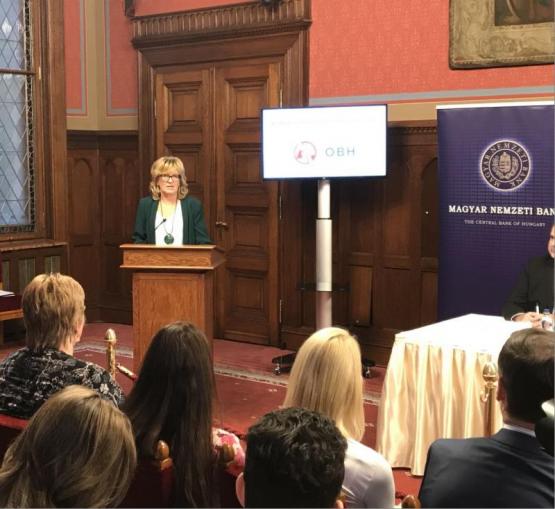Transparency and Trust - Anti-Corruption Roundtable

Seven years after signing their joint declaration, representatives of state institutions and organizations have evaluated their last year's anti-corruption activity in the Parliament.
Since its establishment, the National Office for the Judiciary (NOJ) has made serious efforts to strengthen integrity - emphasized dr. Tünde Handó, at a press conference that followed the Anti-Corruption Roundtable. The President of the NOJ added: a Working Group on Court Integrity was set up in 2012, and on 1st January 2015, the Code of Ethics for Judges also came into force. Regarding future tasks, dr. Tünde Handó said: 2019 will be the year when courts will receive enhanced protection.
At the press conference Minister of Home Affairs dr. Sándor Pintér pointed out that education plays a key role in the fight against corruption. According to Mr. Pintér, the establishment of an electronic administration system is unquestionably a milestone in the fight against corruption.
László Domokos, Head of the State Audit Office, underlined that in 2018 the State Audit Office contributed to prevent corruption and strengthen order by auditing more than 1000 organizations. László Domokos believes that the approach of integrity has already been spread in the public sector today.
Dr. István Lajtár highlighted the active participation of the Hungarian prosecution office within EUROJUST. The Deputy Prosecutor General stated that the results of investigations following the recommendations of the European Anti-Fraud Office (OLAF) are 10 percent above the EU average of 42%.
The Hungarian Supreme Court, the Kúria has renewed its policies in order to serve transparency – said dr. István Kónya in his statement. The Vice President of the Kúria added: apart from judicial secrets, all activities of the Kúria can be traced down, the uniformity of jurisdiction is also part of the fight against corruption.
Integrity is a guarantee of financial stability for financial institutions supervised by the National Bank of Hungary - emphasized dr. László Windisch. According to the Vice-President of the Hungarian National Bank, prevention, education and training play an important role in the fight against corruption.
Csaba Rigó, President of the Public Procurement Authority, underlined that until date in the year 2018, 151 infringement cases have been found and a fine of HUF 268 million has been imposed. According to Csaba Rigó, it was an important step to reduce the number of non-public trial procedures.
State institutions in Hungary have taken major anti-corruption steps in the last seven years. On the initiative of the State Audit Office, the Minister of Public Administration and Justice, the General Prosecutor, the President of the Supreme Court and the President of the State Audit Office signed a joint statement. The National Office for the Judiciary joined this statement in 2012, while the Ministry of Home Affairs in 2014. In 2016, the Public Procurement Authority and the National Bank of Hungary also approved the statement. The signatories have made a moral commitment to strengthen their state-run bodies to resist corruption and develop anti-corruption tools.
From July 1, 2016, integrity rules have been introduced in the Hungarian court system to provide for a unified action against integrity violations and to provide procedure rules to investigate these violations. In the National Office for the Judiciary, at regional courts of appeal and at county courts an integrity officer receives and deals with the announcements concerning the integrity of the judicial system. Since 2015, the National Office for the Judiciary has been publishing an anonymous integrity questionnaire for judges annually. In 2018, 95 percent of respondents said there had been no attempts to influence them. The Code of Ethics, the Code of Integrity and trainings have all contributed to improve public confidence in courts, as shown on the European Commission Scoreboard.